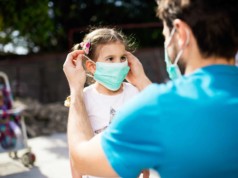These days, it seems like there’s a lot of contradictory information floating around about the safety of vaccines. Despite much fear-mongering by those who are opposed to vaccines, vaccines are a safe and effective way to prevent illness – and that includes the flu vaccine.
But is the flu vaccine safe to use during pregnancy?
Yes. Not only is the flu vaccine safe during pregnancy, it’s considered an essential part of prenatal care for any woman who is pregnant or may get pregnant during the flu season. That’s because the flu vaccine can protect both you and your baby from getting the flu, which can be deadly, especially for young children and pregnant women.
No, the Flu Vaccine Doesn’t Cause Miscarriage
Many women are concerned about getting a flu shot during pregnancy because of the results of a 2017 study that suggest an increased rate of miscarriage among women who receive the flu shot during the first trimester of pregnancy.
The study in question compared the health histories of 485 women aged 18 to 44 who had miscarriages to those of 485 women of the same age who didn’t have miscarriages, to determine whether the women who miscarried were more or less likely to have had the flu vaccine in the 2010 to 2011 or 2011 to 2012 flu seasons.
The study only looked at miscarriages that happened within 28 days after the woman in question received a flu vaccine. The study found that women who had been vaccinated within the first trimester had a higher rate of miscarriage.
However, that doesn’t mean that flu vaccines within the first trimester of pregnancy cause miscarriage. While the study might identify a possible link, there are other reasons why the women in the study could have had a higher rate of miscarriage.
Miscarriage rates in the first trimester are extremely high, and occur for a number of reasons, so these first-trimester miscarriages may not have been related to the flu vaccine at all.
Furthermore, the small size of the study may mean that the results were a fluke; a previous similar study found no increase in miscarriage rates in women who had had the flu vaccine.
Protect Yourself and Your Baby
There is, however, plenty of evidence that getting the flu vaccine during pregnancy can protect both mother and baby. Millions of pregnant women get the flu vaccine each year with no ill effects, and the CDC recommends that pregnant women get the flu vaccine during any trimester of pregnancy to protect themselves and their unborn children.
Getting the flu during pregnancy can cause serious complications. Pregnant women are more likely than non-pregnant women to develop serious illness as the result of a flu infection.
Getting sick with the flu while you’re pregnant could mean an increased risk of needing to be hospitalized for your symptoms, and even an increased risk of death from the flu.
Getting the flu while you’re pregnant can also pose risk for your unborn baby. Any infection that causes a fever during the first trimester of pregnancy can cause birth defects in your baby. Flu during pregnancy also significantly raises your risk of miscarriage and other problems, like low birth weight, fetal death, or premature birth.
The flu vaccine also continues to provide protection for your baby after he or she is born. Your baby can’t get his or her own flu vaccine until six months of age, but the flu poses a serious, even lethal, risk to your baby’s health.
Getting a flu shot at urgent care or from your OB/GYN while you are pregnant passes the immunity on to your baby, who will retain antibodies for several months after birth.
Get the Shot – Not the Nasal Spray
All pregnant women should get the flu shot, since it contains an inactive or dead version of the virus. Do not get the nasal spray, since it contains the live virus.
If you are allergic to eggs, you can still get the flu shot, but if your egg allergy is severe, you should do so under the supervision of a medical professional who can monitor you for allergic reaction symptoms and administer prompt treatment should they appear.
If you’re pregnant and haven’t gotten your flu shot, it’s not too late to take this important precaution to protect yourself and your baby. Get the flu shot; it could save your life, or your baby’s life.












